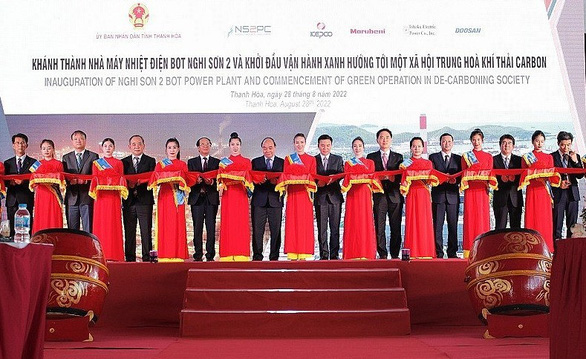Nghi Son 2 thermal power plant, developed by one South Korean and two Japanese investors, was inaugurated and put into operation in Thanh Hoa Province, north-central Vietnam at a ceremony held on Saturday.
With its construction starting in July 2018 in the province’s Nghi Son Town, the wholly foreign-invested plant saw its first generator begin operating in January 2022 and its second one last month, with a combined capacity of 1,330 MW.
Among the total investment of some US$2.8 billion, 50 percent came from Korea Electric Power Corporation (KEPCO), 40 percent from Japan’s Marubeni Corporation, and the remaining 10 percent from another Japanese investor, Tohoku Electric Power Co. Inc.
The project, with its contractor being Doosan Vietnam Heavy Industry Co. Ltd., has been developed in the build-operate-transfer (BOT) form and is expected to contribute around 7-8 billion kWh of power each year to the national grid.
Nghi Son 2 Power Co. Ltd., which was set up in the province by the three above investors, will operate the plant for 25 years before transferring it to the Vietnam Electricity (EVN).
The plant is among the few thermal power plants in Vietnam to use advanced ultra-supercritical technology, which consumes less coal and produces less emissions than traditional facilities, VnExpress cited Hirohide Sagara, president and CEO of Nghi Son 2 Power Co. Ltd., as saying.
Speaking at the inauguration ceremony, Vietnamese Deputy Prime Minister Le Van Thanh affirmed that the new plant is the result of the cooperation between the governments of Vietnam, Japan, and South Korea.
Thanh extended his thanks to the Japanese and South Korean governments for supporting and facilitating the two countries’ large economic groups in investing in Vietnam.
He also hoped that Japan and South Korea will continue to boost cooperation in investment and trade with Vietnam in the coming time, especially in the modernization of the energy industry of the Southeast Asian country.
As from 2030, Vietnam will stop constructing new coal-fueled thermal power plants to realize its commitment at the 2021 United Nations Climate Change Conference (COP26) to reach net-zero emissions by 2050, said Deputy Minister of Industry and Trade Dang Hoang An at the online ASEAN High-Level Policy Dialogue on Coal on August 11.
The capacity of coal-run thermal power plants across the country will be reduced gradually to account for only 13.2 percent of Vietnam’s total power capacity by 2045, instead of the 32 percent at present, An stressed.
Like us on Facebook or follow us on Twitter to get the latest news about Vietnam!

















































